|
NTS-Asia Newsletter No.22
Upcoming Events
Food Security Expert Group Meeting on ‘Food First: Ensuring Food and Nutrition for Urbanites’
RSIS Centre for Non-Traditional Security (NTS) Studies
4 – 5 August 2010
Singapore
 | | Credit: PK Hangzo, 2000 |
Rising global food prices between 2007 and 2008 has pushed food security to the very forefront of the international political agenda. The situation has pushed tens of millions more people into hunger and poverty, with civil unrest flaring up in locations all over the world. Exporting countries have also introduced export restrictions on food, even as many importing countries attempt to tackle the issue through subsidies and price controls. These events underline the scale of the challenges that the world’s policymakers and peoples will face in the decades ahead. Addressing them will entail considerable risk, uncertainty and turbulence.
It is against this backdrop that the RSIS Centre for NTS Studies sets out to organise the Food Security Expert Group Meeting in Traders Hotel, Singapore from 4 to 5 August 2010. The meeting will take the form of sessions with panel speakers and focus group discussions with the aim to generate insightful and intensive discussions among participants. The meeting seeks to: (1) scope out the context of ‘urban food security’ relative to global food security and rural food security; (2) explore the development of an ASEAN (Association of Southeast Asian Nations) Integrated Food Security Management Information System; (3) develop a comprehensive research agenda on urban food security, including identification of potential collaborators; and (4) identify possible roles for net food importing states like Singapore in the global food system.
Click here for more information on the workshop.
ISDS Events from August to November 2010
Institute for Strategic and Development Studies (ISDS)
August – November 2010
ISDS will be organising a slew of events in the second half of 2010. These include the ‘Second Meeting of the Global Consortium on Security Transformation Working Group on Regional Security (GCST WGRS)’, in partnership with RESDAL Argentina on 15 August; the ‘Council for Security Cooperation in the Asia Pacific (CSCAP) Steering Committee Meeting’ from 21 to 22 September; the ‘Council for Security Cooperation in the Asia Pacific (CSCAP) Study Group on the Responsibility to Protect Meeting’ from 20 to 21 September 2010; the ‘12th East Asia-Europe Think Tank Dialogue’ from 14 to 15 October in Seoul, South Korea; and the ‘First Dialogue on Democracy and ASEAN Integration’ from 4 to 7 November in Cavite City, the Philippines.
Click here for more information on ISDS.
Conference on ‘Early Warning for Protection: Technologies for the Prevention of Mass Atrocity Crimes’
Asia-Pacific Centre for the Responsibility to Protect (APC-R2P)
3 – 4 November 2010
Cambodia
From 3 to 4 November 2010, Oxfam Australia, in collaboration with the APC-R2P and the International Coalition for RtoP, will host a conference on ‘Early Warning for Protection: Technologies for the Prevention of Mass Atrocity Crimes’ at Phnom Penh Hotel, Cambodia. The programme brings together both technology and early-warning specialists, and members of the international humanitarian community concerned with the protection of vulnerable populations and the prevention of mass atrocity crimes. These will include specialists from the UN and regional organisations, non-governmental organisations (NGOs), scholars, government representatives and affected communities. Speakers include Mr Francis Deng, UN Special Advisor to the Secretary-General on the Prevention of Genocide; and Mr Patrick Meier, Director of Crisis Mapping, Ushahidi.
Registration is now open, and there are a limited number of full and partial travel grants available for attending the conference. Grant applications close Friday, 3 September 2010.
Click here for additional information on the event.
^ To the top
Announcements
2010 NTS-Asia Research Fellowship Selection Results
This year’s call for proposals for the NTS-Asia Research Fellowship received 48 applications – nearly double the number of proposals received the previous year. Applicants hail from diverse backgrounds (including 2 from Africa), of which 13 proposed topics were related to Northeast Asia, 12 topics related to Southeast Asia, and 23 related to South Asia.
The NTS-Asia Research Fellowship Review Committee has decided to offer this year’s three-month fellowship to:
PhD candidate, Centre for International Security Studies (CISS), University of Sydney, Australia
 Ben Shepherd has a Masters degree in International Relations and is undertaking a PhD with CISS at the University of Sydney. For many years, Ben was a senior corporate executive working with international financial institutions and government agencies (including military and intelligence organisations) in the deployment of high-security technologies, but moved away from business to study politics and international security. Ben Shepherd has a Masters degree in International Relations and is undertaking a PhD with CISS at the University of Sydney. For many years, Ben was a senior corporate executive working with international financial institutions and government agencies (including military and intelligence organisations) in the deployment of high-security technologies, but moved away from business to study politics and international security.
Mr Shepherd’s fascination for politics and international security, combined with his social conscience and a great passion for food, has led him to focus his NTS-Asia research on food security; namely, the ‘Impact of Land Acquisition Deals on Security with respect to the Philippines’. He will be conducting his fellowship in the Institute for Strategic and Development Studies (ISDS) in The Philippines.
Political Scientist, Germany
 Dr Yu-Wen Chen is a political scientist specialising mainly (but not exclusively) in ethnic mobilisation and interest group politics. She is the author of the book Transnational Cooperation of Ethnopolitical Mobilization: A Survey Analysis of European Ethnopolitical Groups (2009), and the book The Tug-of-War over Taiwan in the US: A Case Study of the Formosan Association for Public Affairs (2008). Dr Yu-Wen Chen is a political scientist specialising mainly (but not exclusively) in ethnic mobilisation and interest group politics. She is the author of the book Transnational Cooperation of Ethnopolitical Mobilization: A Survey Analysis of European Ethnopolitical Groups (2009), and the book The Tug-of-War over Taiwan in the US: A Case Study of the Formosan Association for Public Affairs (2008).
Dr Chen has worked as a post-doctoral fellow at the Chair of International Politics at the University of Konstanz, and was a lecturer of comparative politics at the University of Greifswald in Germany.
Since 2009, Dr Chen has been working on the international mobilisation of the Uyghurs. Her most recent working paper is ‘Who Made Uyghurs Visible in the International Arena?: A Hyperlink Analysis’, published by the Center for Global Studies at George Mason University, USA.
Dr Chen’s topic during her fellowship term will be ‘Transporting Conflicts via Migratory Routes: A Social Network Analysis of the Uyghur International Mobilization’. She will be conducting her fellowship in the Institute of Human Security at La Trobe University, Australia.
Associate Director, Centre for Migration and Refugee Studies (CMRS), American University in Cairo (AUC)
 Dr AKM Ahsan Ullah is currently Associate Director and Assistant Professor in CMRS, AUC. Dr AKM Ahsan Ullah is currently Associate Director and Assistant Professor in CMRS, AUC.
A development practitioner who has worked with international NGOs such as Plan International, he has conducted and headed research projects on rural poverty alleviation, rural to urban migration, child development, HIV/AIDS, and disaster management.
Dr Ullah will conduct research on the topic of the ‘Psychological Trauma of the Displaced Disabled Populations: Multiple Burden of the Forgotten Victims of the Tsunami’ during his fellowship in the Centre for Strategic and International Studies (CSIS), Jakarta.
NTS-Asia Sub-regional Workshops 2011
Two NTS-Asia sub-regional workshops will be organised – with support from the Ford Foundation – in 2010 by the Regional Centre for Strategic Studies (RCSS), Colombo; and the Ilmin International Research Institute (IIRI), University of Korea respectively.
RCSS’ sub-regional workshop on ‘Ending the Displacement Cycle: Finding Durable Solutions through Return and Resettlement’ will take place in Colombo, Sri Lanka, in January 2011. The objective of this workshop is to evaluate the policies of South and Southeast Asian states pertaining to the return and resettlement of Internally Displaced Persons (IDPs) who are displaced due to internal conflicts, natural disasters and development projects.
IIRI’s sub-regional workshop on the ‘Securitisation of Climate Change’ will be held in the University of Korea in Seoul on March 2011. The workshop will attempt to identify the climate insecurities in Asia and assess the extent to which regional organisations have responded to these insecurities; with the aim of identifying ways to increase the accountability of regional organisations to address climate change. Other sponsors for this workshop include the Korean government and Korea University.
BIPSS Launches Regional Climate Change and Security Research Project
 The Bangladesh Institute of Peace and Security Studies (BIPSS), in association with the John D. and Catherine T. MacArthur Foundation, has launched a major new research project on the security impact of climate change on Bangladesh and its regional neighbours (specifically India, Nepal and the Maldives). The seminal project will examine the latest scientifically acceptable prognostications of climate change affecting Bangladesh, focusing on asset losses – especially loss of land and livelihood to rising sea levels, saline intrusions, periodic surge flooding, environmental damage, and the extent and intensity of resultant internal displacement and potential migration. The Bangladesh Institute of Peace and Security Studies (BIPSS), in association with the John D. and Catherine T. MacArthur Foundation, has launched a major new research project on the security impact of climate change on Bangladesh and its regional neighbours (specifically India, Nepal and the Maldives). The seminal project will examine the latest scientifically acceptable prognostications of climate change affecting Bangladesh, focusing on asset losses – especially loss of land and livelihood to rising sea levels, saline intrusions, periodic surge flooding, environmental damage, and the extent and intensity of resultant internal displacement and potential migration.
The project will ascertain the status and adequacy of national, regional and local planning, and administrative provisions in place to cope with the consequences of climate change; evaluate the stresses arising from large-scale IDP movement on national productive capacities and processes, economic infrastructure, public-administrative institutions, services provision, and societal cohesion and order; as well as examine coping mechanisms. It will assess the need for modifying policy and resource-allocation priorities, identifying what advantages might accrue from diplomatic endeavours to seek assistance from India and OECD (Organisation for Economic Co-operation and Development) donors.
The project will establish critical linkages between Bangladesh, India and Nepal in addressing systemic challenges arising from climate change – assessing the merit of the 'river basin' framework for triangular collaboration in mitigating and managing the consequences of climate change. It will conduct a comparative study of the threat faced by the Maldives, examining the latter's policy response to ascertain if lessons can be derived from the Maldivian experience.
On the bases of the above-mentioned exercises, the project will establish the nature and scale of the threats to the security of the Bangladeshi state and society that stem from climate change, posit realistic approaches to mitigating the most adverse outcomes, and generate appropriate policy-recommendations for Bangladesh, its neighbours, and development partners. The project's findings and recommendations will be launched at an international conference at the conclusion of the study.
RSIS Centre for Non-Traditional Security (NTS) Studies ‘In Conversation’ Series
 This latest collection of ‘In Conversation’ interviews showcases the thoughts of experts and scholars on the issues of health, the Responsibility to Protect (RtoP) and nuclear energy, in relation to non-traditional security (NTS). The interviews were conducted on the sidelines of the Conference on ‘Strengthening Health and Non-Health Response Systems in Asia’, the Regional Consultation on ‘the Responsibility to Protect’, and the ‘Nuclear Energy and Human Security’ Workshop respectively. This latest collection of ‘In Conversation’ interviews showcases the thoughts of experts and scholars on the issues of health, the Responsibility to Protect (RtoP) and nuclear energy, in relation to non-traditional security (NTS). The interviews were conducted on the sidelines of the Conference on ‘Strengthening Health and Non-Health Response Systems in Asia’, the Regional Consultation on ‘the Responsibility to Protect’, and the ‘Nuclear Energy and Human Security’ Workshop respectively.
Click here to view the interviews.
|
^ To the top
Recent Events
Roundtable Discussion on ‘The Millennium Development Goals and Bangladesh: Present Status and an Outlook for the Future’
Bangladesh Institute of International and Strategic Studies (BIISS)
21 July 2010
Bangladesh
A Roundtable Discussion on ‘The Millennium Development Goals and Bangladesh: Present Status and an Outlook for the Future’ was held at the BIISS Auditorium on 21 July 2010. Dr Mashiur Rahman, Adviser to the Honorable Prime Minister on Economic Affairs, Government of the People’s Republic of Bangladesh, was the Chief Guest of the event. Major-General Golam Mohammad, nwc, psc, Director-General of BIISS, delivered the welcome address. Two presentations were made prior to the roundtable discussion. Dr Mohammad Mahfuz Kabir, BIISS Research Fellow, made a presentation on ‘Challenges of Financing MDGs’. Mr Arastoo Khan, Additional Secretary in the Economic Relations Division, Ministry of Finance, Government of the People’s Republic of Bangladesh, presented a paper on ‘Dynamics of Resource Mobilisation and Donor Relations’. Major-General Muhammed Firdaus Mian, psc, Chairman of the BIISS Board of Governors, chaired the session. The open discussion of the roundtable was lively and rewarding; allowing for experts and practitioners to exchange views on the issue.
Click here to access the presentations delivered at the event.
Aquaculture Projects, Planning and Technical Feasibility Training Programme
WorldFish Regional Center
12 – 21 July 2010
Egypt
Conducted by the Worldfish Regional Center in Abbassa, Skarkia, Egypt, the objectives of this course were to educate participants on how to initiate aquaculture projects – covering technical and economical aspects – and how to prepare project feasibility studies. Economic indicators commonly used in project appraisal and financial analysis were introduced and discussed in the context of investment decision-making. The course was designed for managers, engineers, investors, researchers, technicians, and extension workers who are involved in either the preparation or evaluation of feasibility studies in the public or private sector. This course also targeted bank credit officers and economists responsible for evaluating or financing investment projects.
Click here for more information on the training course.
Regional Workshop on the Protection of Civilians
RSIS Centre for Non-Traditional Security (NTS) Studies
15 – 16 July 2010
Singapore
 | | Credit: UN Photo |
The ASEAN region has in recent history faced many types of emergencies and crisis situations, ranging from internal conflicts to natural disasters. Whether it be the conflict in southern Thailand, Typhoon Ketsana in the Philippines or post-conflict challenges in Aceh, humanitarian emergencies often result in widespread displacement, increased gender based violence and unanticipated health and security challenges. Consequently, it becomes especially important to question the protection of populations during this period. How well are state and non-state actors able to cope with protecting civilians not just during peace time, but also during such humanitarian emergencies?
It is with these issues in mind that the RSIS Centre for NTS Studies and the International Committee of the Red Cross (ICRC) organised a regional workshop on the protection of civilians (POC). Held from 15 to 16 July at the ParkRoyal Hotel Singapore, the workshop gathered over 50 participants including scholars, practitioners, members of civil society and international organisations, and examined the protection situation of particularly vulnerable and marginalised populations in the region, such as women, children, IDPs, refugees, migrants and the stateless. It was envisioned that key policy recommendations from this workshop would emerge, specifically addressing the most pressing regional protection concerns, such as trafficking, sexual exploitation as well as abuse and domestic violence.
The workshop was one of the many activities conducted under the Centre’s Internal and Cross-Border Conflict programme, which concentrates its research areas on the following core topics: (1) analysis of the dynamics of internal conflicts in the region; (2) POC; (3) RtoP; (4) mulit-level and multilateral approaches to internal conflict; and (5) Security Sector Governance (SSG).
A report of this workshop will be available online soon.
MacArthur Asia Security Initiative Annual Meeting
RSIS Centre for Non-Traditional Security (NTS) Studies
7 – 9 July 2010
South Korea
The RSIS Centre for NTS Studies participated in the MacArthur Asia Security Initiative (MASI) 2010 Annual Meeting in Seoul from 7 to 9 July 2010. Representatives from the Centre were Associate Professor and Head of Centre, Dr Mely Caballero-Anthony, and Programme Officer, Belinda Chng. Building on the success of the inaugural MASI Grantees Meeting and Official Launch held in Singapore in May 2009, the second annual meeting organised by the East Asia Institute in Seoul brought together over 46 participants from 35 institutions across 9 countries in Asia. The meeting enabled participating institutions to develop stronger research networks and provided a venue for MASI grantees to share their research findings, exchange ideas and explore areas for potential collaboration.
The meeting focused on two themes – 1) Post Crisis Global and Regional Order and 2) East Asian Community. The sessions on Post Crisis Global and Regional Order touched upon issues such as the blurring lines between traditional and non-traditional security; the role of institutions and the importance of institutional design; and emerging challenges which include resource scarcity, food security, climate change and environmental degradation. The sessions on East Asian Community discussed issues such as the impact of the economic crises on the balance of power, the rise of China, the conditions for East Asian regionalism and a sense of community in East Asia.
In moving forward, the meeting concluded that it would be important for Asia to develop a common vision in its contribution towards building a global community, transform the fundamental organising principle from balance of power to networked sovereignty and take advantage of global norms. With regard to the MASI network, participants were urged to develop diverse ways for cooperation among network institutes, focus on policy relevant studies and expand the pool of young researchers.
Click here for more information on the Asia Security Initiative.
8th Ilmin Forum for International Affairs and Security
Ilmin International Relations Institute (IIRI)
24 June 2010
South Korea
On 24 June 2010, IIRI held its 8th Ilmin Forum for International Affairs and Security (IFIAS). This IFIAS event is part of activities conducted under the ongoing Asia Security Initiative, which was launched by IIRI in August 2009 with a grant by the MacArthur Foundation.
During the forum, Professor Han Yongseop of Korea National Defense University, Senior Research Fellow Yoon Dukryung of the Korea Institute for International Economic Policy, and Research Fellow Shin Bamchul of the Korea Institute for Defense Analyses, discussed three key topics: ‘Politico-Military Consequences of North Korea’s crisis’, ‘Economic Consequences of North Korea’s crisis’, and ‘Legal Consequences of North Korea’s crisis’. Academics, journalists, and other think tank experts engaged in a lively debate on these themes.
Workshop on ‘Civil-Military Relations: Trust Building’
Bangladesh Institute of International and Strategic Studies (BIISS)
22 – 23 June 2010
Bangladesh
A two-day workshop on ‘Civil-Military Relations: Trust Building’ was organised by BIISS with the support of the Defense Institution Reform Initiative (DIRI) of USA at the Dhaka Sheraton Hotel from 22 to 23 June 2010. Hosts Major-General Golam Mohammad, nwc, psc, Director-General of BIISS and Major-General Eric Olson (Retd) of DIRI, delivered the welcome address and welcome speech respectively. Two papers were presented in the inaugural session. Dr Syed Anwar Husain, Professor in the Department of History, University of Dhaka, presented a paper on ‘Identifying and Promoting Common Goals to Build Confidence and Trust in Civil-Military Relations in Bangladesh’; and Air Commodore Ishfaq Ilahi Choudhury, ndc, psc, (Retd), Registrar, BRAC University, Dhaka, presented a paper on ‘Improving Military’s Ability to Relate with Civil Society in Bangladesh’. Mr M. Idris Ali, Member of Parliament and Chairman of the Parliamentary Standing Committee in the Ministry of Defence, Bangladesh, was Chief Guest of the event. Major-General Muhammed Firdaus Mian, psc, Chairman of the BIISS Board of Governors, chaired the session and delivered the closing remarks. The opening session of the workshop saw active participation by diplomats, members of the academia and the media, government officials, business professionals, representatives from civil society, and other concerned professionals.
The later half of the first day was held with the nominated members of the workshop. These included members of parliament, former ministers, opposition party members, senior civil and military officials both serving and retired, and civil society representatives. The second day was devoted to meaningful deliberations on related issues.
Click here for more information on the workshop.
APC-R2P Holds RtoP Workshop in Cambodia
Asia-Pacific Centre for the Responsibility to Protect (APC-R2P)
16 – 17 June 2010
Cambodia
On 16 and 17 June 2010, the APC-R2P, in collaboration with the Cambodian Institute for Cooperation and Peace, hosted a two-day workshop on ‘Responsibility to Protect Constituency Building’ in Cambodia at Sunway Hotel, Phnom Penh. The workshop was the first event of a series of planned consultations on RtoP constituency-building in Cambodia to attempt to gather the views of public intellectuals, government and military officials in their private capacities, retired diplomats, civil society organisation representatives, and eminent scholars and researchers who have an interest in understanding, debating, and/or advocating RtoP principles in Cambodia and the region. The workshop opening remarks were made by HRH Samdech Norodom Sirivudh, Supreme Privy Counsellor to His Majesty the King; and Ms Fiona Cochaud, Deputy Head of Mission and First Secretary of the Australian Embassy, Phnom Penh. A workshop report will be made available shortly.
Seminar on ‘Overview of the Recent Developments of Burma-China Relations’
RSIS Centre for Non-Traditional Security (NTS) Studies
15 June 2010
Singapore
This seminar organised by the RSIS Centre for NTS Studies discussed the history of armed groups in Myanmar’s civil war and how the Myanmar government’s strategy in dealing with them has continued to affect its relations with China. Seminar speaker, Dr Tharaphi Than, Lector in the Department of Southeast Asia, School of African and Oriental Studies, London, observed that far from being an invariable relationship, Myanmar-China relations may evolve depending on the strategies that Naypyidaw applies to dealing with the country’s ethnic minorities.
The seminar began with a discussion of Myanmar’s history, tracing the development of armed groups from the outbreak of the Second World War in 1941 to the present. Chinese links with the ethnic minorities in Myanmar, observed Dr Than, could be traced back to as early as 1949 when communist rebels from Myanmar fled to Guangzhou, China, during the civil war.
Since 1949, armed ethnic minority groups, have wanted to establish sovereign states. This has always been met with government opposition. A few years ago, the government implemented plans to integrate all armed ethnic minority groups into a union under the command of the Tatmadaw (Myanmarese Armed Forces) under a ‘border force agreement’.
Dr Than noted that China has publicly advocated a hands-off policy in Myanmar’s internal affairs, while simultaneously sustaining the ethnic minority groups as a buffer between itself and the military government in Naypyidaw. It has signed a number of economic agreements with some of the states of Myanmar – thanks to a loophole in the agreements – despite the fact that it had earlier declared that it would not aid the armed ethnic minority groups.
While economic and military ties between China and Burma have increased, Dr Than concluded that this relationship will be coloured by the game China plays in sustaining the survival of the ethnic minorities while also ensuring that the military government in Naypyidaw retains strength and coherence.
Workshop on ‘Human Security: From Ideas to Practice’
Institute for Human Security (IHS), La Trobe University
8 June 2010
Australia
Organised by IHS at La Trobe University and funded by the Academy of the Social Sciences in Australia, the ‘Human Security: From Ideas to Practice’ workshop was held on 8 June 2010. This was the first workshop under the 2009 ARC Learned Academies Special Project. The project, ‘Reconceptualising Human Security: Its Uses and Limitations for Developing Australian Foreign Policy’, is lead by Professors Dennis Altman, Joseph Camilleri and Robin Eckersley.
The project’s aim is to ‘interrogate the concept of human security and the potential to apply the concept to key aspects of Australia’s foreign policy and external relations, both in the Asia- Pacific region and globally’. It will do this by examining the manner in which emerging security issues, such as identity based conflicts, terrorism, the drug trade, human trafficking, new epidemic diseases, climate change and food security, might be more efficiently connected with more traditional concerns of inter-state armed conflict. In so doing, the project will question how far the concept of human security needs to be analytically refined in order to be of practical use in policymaking and policy delivery, with particular focus on the Australian context.
Click here to access IHS’ website.
Inception Meeting on ‘Dealing with Energy Vulnerabilities: Case Studies of Cooperation and Collaboration in East Asia’
RSIS Centre for Non-Traditional Security (NTS) Studies
4 June 2010
Singapore
 | | Credit: Aleksandar Rodic, 2009 |
Much literature on East Asia’s energy security has focused on the dynamics of competition over resources and how potential conflicts could arise from this. While this analytical perspective identifies potential risks and problems, it precludes the possibility that interstate cooperation is possible.
Therefore, going beyond the themes of competition and conflict, the project titled Dealing with Energy Vulnerabilities: Case Studies of Cooperation and Collaboration endeavours to examine interstate cooperation and collaboration in East Asia against the backdrop of continuing geopolitical uncertainties and tension. Specifically, this project aims to examine how transnational projects of energy cooperation and collaboration have taken place in the region, despite the emphasis on geopolitics in determining policy.
The case studies adopted in this project centre on the 10 ASEAN member states, as well as China, Japan and South Korea. A key assumption underpinning this project is that shortages in and uncertainties over energy supplies – that is, energy vulnerabilities – constitute a normative part for these case countries under examination. Five research agendas are outlined: 1) stock-taking of trade in fossil fuels among East Asian states; 2) the ‘Asian Premium’ phenomenon; 3) developmental institutions and energy in East Asia; 4) energy vulnerabilities unique to East Asian societies; and 5) the benefits and barriers of regional Asian energy projects.
It is hoped that findings obtained from this project can stimulate debates about energy policymaking and institutionalisation in East Asia, and add value to the field of contemporary energy security studies in this region. For this purpose, on 4 June 2010, a closed-door, energy study group inception meeting was convened at the S. Rajaratnam School of International Studies, Nanyang Technological University. A total of 15 participants gathered to discuss the five proposed research agendas, with the goal of finalising the research roadmap for this project.
The project is moving on to its second phase where commissioned writers will conduct individual research within an approximate six-month period. It shall culminate in a one-and-a-half day regional energy workshop tentatively to be held from 9 to 10 December 2010, during which the writers will present their research findings.
Please click here to access the proceedings of the meeting.
Field Studies on Non-Traditional Security Capacity Building in the Field of Civil Defence
Center for Non-Traditional Security and Peaceful Development Studies (NTS-PD)
11 May and 13 – 14 April 2010
South Korea and China
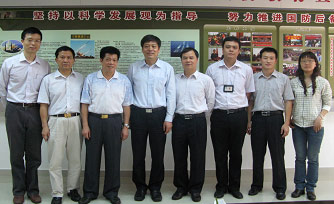 | | Field trip to Shenzhen |
NTS-PD Director, Professor Yu Xiaofeng, and PhD students Li Jia and Liao Danzi, made a field trip in May to the National Emergency Management Agency (NEMA) in Seoul, South Korea, to study the country’s civil defence structure and research on how to better model the Chinese structure of civil defence and incorporate it into the NTS management system of China. One Korean policy worth exploring is the comprehensive training course Seoul has established for staff in its civil defence division.
A second field trip on civil defence was made to Shenzhen, China in April. Shenzhen has taken the lead in the country to establish a new emergency organisation – comprising a department on civil defence, a committee on safety, a bureau on safety production and a bureau on earthquakes – to provide a full range of emergency services at the lowest cost. The organisation highlights an element of NTS management, i.e., the reconciliation of different departments that play different roles to provide the quickest response in the face of emergencies.
Forum on ‘Public Power Supervision’
Center for Non-Traditional Security and Peaceful Development Studies (NTS-PD)
13 May 2010
China
NTS-PD and officials from Shaoxing, Zhejiang Province in China organised a forum on ‘Public Power Supervision’ on 13 May 2010. At the forum, participants discussed how local public power can be executed most efficiently and how this can be supervised. They finally agreed to follow the ‘Six Musts on QianQing’, which include the need to clarify the types of pubic power, the elimination of power risks, the recording of decision-making processes, and the need for performance evaluation and accountability.
Inception Meeting on ‘Mainstreaming Human Security in ASEAN Integration’, and ‘17th ASEAN-ISIS Colloquium on Human Rights’
Institute for Strategic and Development Studies (ISDS)
17 April and 8 – 9 February 2010
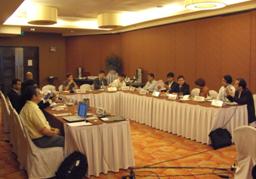 | Inception Meeting on ‘Mainstreaming Human Security in ASEAN Integration’
|
ISDS organised on 17 April 2010, an inception meeting on ‘Mainstreaming Human Security in ASEAN Integration’ as part of the second year of the ASEAN ISIS-JICA (ASEAN Institutes of Strategic and International Studies-Japan International Cooperation Agency) project. Participants in the meeting were asked to present their proposals under two main themes: regional public goods and Millennium Development Goals (MDGs). The event allowed for an exchange of ideas and comments on the proposals, with additional insights from guest commentators.
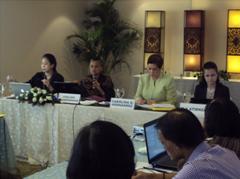 | | 17th ASEAN-ISIS Colloquium on Human Rights |
The ‘17th ASEAN-ISIS Colloquium on Human Rights’ organised by ISDS in February focused on the relationship between human rights and ASEAN community building within the context of the establishment of the ASEAN Intergovernmental Commission on Human Rights (AICHR). The majority of participants in this event were members of civil society groups and the academe.
Inception Meeting on ‘Security Sector Governance and Conflict Management in Southeast Asia’
and ‘2nd Annual General Meeting of the Association for Security Sector Reform Education and Training’
Institute for Strategic and Development Studies (ISDS)
15 April and 2 – 4 March 2010
The Philippines
 | Inception Meeting on ‘Security Sector Governance and Conflict Management in Southeast Asia’
|
On 15 April 2010, ISDS organised, in partnership with the S. Rajaratnam School of International Studies (RSIS), an inception meeting to discuss the book project on SSG and conflict management in the region. During the meeting, case presenters delivered presentations with regard to the SSG situations in their respective countries. The meeting also provided participants with an opportunity to exchange ideas, insights and comments in relation to each of the case studies.
 | 2nd Annual General Meeting of the Association for Security Sector Reform Education and Training
|
From 2 to 4 March 2010, ISDS hosted the 2nd Annual General Meeting of the Association for Security Sector Reform Education and Training (ASSET) in the EDSA Shangri-La Hotel, Manila. The ASSET is an association of education and training organisations and institutions that support the development of Security Sector Reform (SSR) capacity among various SSR stakeholders.
Seminar on ‘Hindu Organizations in Education, Health and Development Work’
Centre for the Study of Developing Societies (CSDS)
2 – 4 March 2010
India
An international seminar on ‘Hindu Organizations in Education, Health and Development Work’ was held in March 2010 at Seminar Hall, Nehru Memorial Museum and Library, Teen Murti House.
The seminar – which is perhaps the first of its kind – was organised by the Indic Studies Project, Centre for the Study of Developing Societies; in collaboration with Nehru Memorial Museum and Library, New Delhi. In addition to the academic papers that were presented during the seminar, a select group of faith practitioners and spiritual leaders were also invited (many of whom are scholars in their own right) to speak about the inspirational philosophy of their respective organisations and faith tradition. This novel experiment at creating a space for dialogue between scholars and faith leaders aimed to forge a fresh approach to the study of faith traditions in India.
Click here for more information on CSDS.
^ To the top
Recent Publications
Indonesia and Post-New Order Reforms: Challenges and Opportunities for Promoting the Responsibility to Protect
Asia-Pacific Centre for the Responsibility to Protect (APC-R2P), Research Report on Indonesia No. 1, July 2010
 This report examines some of the challenges and possibilities for implementing the RtoP principles in Indonesia by evaluating reforms made in relevant areas over the past ten years. The overall purpose of this report is to provide a background on relevant issues within Indonesia today for professionals with an interest in RtoP. This report examines some of the challenges and possibilities for implementing the RtoP principles in Indonesia by evaluating reforms made in relevant areas over the past ten years. The overall purpose of this report is to provide a background on relevant issues within Indonesia today for professionals with an interest in RtoP.
|
|
Energy Group Inception Meeting on Dealing with Energy Vulnerabilities: Case Studies of Cooperation and Collaboration in East Asia
RSIS Centre for Non-Traditional Security (NTS) Studies, Inception Meeting Report, June 2010
 This report contains the proceedings of the Energy Inception Meeting that took place on 4 June 2010. Organised by the RSIS Centre for NTS Studies as part of activities for its Energy and Human Security Programme, the meeting was an opportunity to discuss five research agendas outlined in the Centre’s energy and human security project titled ‘Dealing with Energy Vulnerabilities: Case Studies of Cooperation and Collaboration’. The five research agendas are: 1) stock-taking of trade in fossil fuels among East Asian states; 2) the ‘Asian Premium’ phenomenon; 3) developmental institutions and energy in East Asia; 4) energy vulnerabilities unique to East Asian societies; and 5) the benefits and barriers of regional Asian energy projects. This report contains the proceedings of the Energy Inception Meeting that took place on 4 June 2010. Organised by the RSIS Centre for NTS Studies as part of activities for its Energy and Human Security Programme, the meeting was an opportunity to discuss five research agendas outlined in the Centre’s energy and human security project titled ‘Dealing with Energy Vulnerabilities: Case Studies of Cooperation and Collaboration’. The five research agendas are: 1) stock-taking of trade in fossil fuels among East Asian states; 2) the ‘Asian Premium’ phenomenon; 3) developmental institutions and energy in East Asia; 4) energy vulnerabilities unique to East Asian societies; and 5) the benefits and barriers of regional Asian energy projects.
|
|
Workshop on Nuclear Energy and Human Security
RSIS Centre for Non-Traditional Security (NTS) Studies, Workshop Report, April 2010
 This report contains the proceedings of a workshop organised by the RSIS Centre for NTS Studies on nuclear energy and human security on 24 April 2010. Discussions focused on the pros and cons of adopting nuclear energy, from the environmental, economic and security perspective. In addition, the role of civil society organisations (CSOs), which play a vital role in centering the issue on human security concerns in nuclear energy policymaking was discussed. This report contains the proceedings of a workshop organised by the RSIS Centre for NTS Studies on nuclear energy and human security on 24 April 2010. Discussions focused on the pros and cons of adopting nuclear energy, from the environmental, economic and security perspective. In addition, the role of civil society organisations (CSOs), which play a vital role in centering the issue on human security concerns in nuclear energy policymaking was discussed.
|
|
Conference on ‘Starving Tigers? Impact of Climate Change in South East Asia’
RSIS Centre for Non-Traditional Security (NTS) Studies and Earth Observatory of Singapore (EOS), Conference Report, January 2010
 This is a report of the proceedings of the Conference on ‘Starving Tigers? Impact of Climate Change in South East Asia’ that was held from 26 to 27 January 2010 in Singapore and jointly organised by the RSIS Centre for NTS Studies and EOS. Topics of discussion included historical perspectives on climate-induced food and water insecurities; and the impact of climate change on food security, fisheries and aquaculture in Southeast Asia, among others. This is a report of the proceedings of the Conference on ‘Starving Tigers? Impact of Climate Change in South East Asia’ that was held from 26 to 27 January 2010 in Singapore and jointly organised by the RSIS Centre for NTS Studies and EOS. Topics of discussion included historical perspectives on climate-induced food and water insecurities; and the impact of climate change on food security, fisheries and aquaculture in Southeast Asia, among others.
|
|
Powering Growth: The Non-Traditional Security (NTS) Perspective on the Energy Security Policies in Singapore
Youngho Chang and Nur Azha Putra, Asia Security Initiative Policy Series Working Paper No. 4, June 2010
 The Singapore government treats energy security as a means towards achieving sustainable economic growth. It is on that note that the Economic Strategies Committee (ESC) and National Energy Policy (NEP) reports recommended strategies which are meant to steer the nation towards economic competitiveness, energy security and environmental sustainability. However, the NTS perspective argues that energy security should also account for the welfare and development of individuals, households and communities, among other things. Building upon the NTS discourse, this paper attempts to unpack Singapore’s energy policies by tracing and analysing the rationale behind the role of oil in the nation’s economic development, and explores its implication for human security. The Singapore government treats energy security as a means towards achieving sustainable economic growth. It is on that note that the Economic Strategies Committee (ESC) and National Energy Policy (NEP) reports recommended strategies which are meant to steer the nation towards economic competitiveness, energy security and environmental sustainability. However, the NTS perspective argues that energy security should also account for the welfare and development of individuals, households and communities, among other things. Building upon the NTS discourse, this paper attempts to unpack Singapore’s energy policies by tracing and analysing the rationale behind the role of oil in the nation’s economic development, and explores its implication for human security.
|
|
MacArthur Asia Security Initiative Interim Report 2010
RSIS Centre for Non-Traditional Security (NTS) Studies, Report to Funders, June 2010
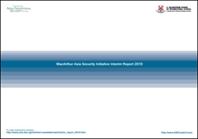 This interactive report summarises the first year of the Asia Security Initiative (ASI) project of the RSIS Centre for NTS Studies titled ‘Responding to Internal Crises and their Cross Border Effects’. The report covers the period May 2009, when the ASI was launched in Singapore, to June 2010. This interactive report summarises the first year of the Asia Security Initiative (ASI) project of the RSIS Centre for NTS Studies titled ‘Responding to Internal Crises and their Cross Border Effects’. The report covers the period May 2009, when the ASI was launched in Singapore, to June 2010.
|
|
Regional Champions – Examining the Comparative Advantages of AICHR and ACWC
Alistair D.B. Cook and Priyanka Bhalla, NTS Insight June Issue, June 2010
 The last two years have witnessed the emergence of several new and promising policy entry points for the advancement of POC in Southeast Asia. On 23 October 2009, AICHR was launched. This was followed six months later, on 7 April 2010, by the inauguration of the ASEAN Commission on the Promotion and Protection of the Rights of Women and Children (ACWC). This Insight investigates how current regional institutional developments could affect and advance the POC agenda in the ASEAN region. It also provides some key recommendations for how the AICHR and ACWC might collaborate and coordinate more effectively with one another, thus maximising the benefits of these institutional developments for the security and well being of peoples/populations across the region. The last two years have witnessed the emergence of several new and promising policy entry points for the advancement of POC in Southeast Asia. On 23 October 2009, AICHR was launched. This was followed six months later, on 7 April 2010, by the inauguration of the ASEAN Commission on the Promotion and Protection of the Rights of Women and Children (ACWC). This Insight investigates how current regional institutional developments could affect and advance the POC agenda in the ASEAN region. It also provides some key recommendations for how the AICHR and ACWC might collaborate and coordinate more effectively with one another, thus maximising the benefits of these institutional developments for the security and well being of peoples/populations across the region.
|
|
Transnational Organised Crime in Southeast Asia: Threat Assessment
Mely Caballero-Anthony and Pau Khan Khup Hangzo, NTS Alert July Issue No. 1, July 2010
 Efforts against transnational organised crime traditionally focus on organised crime groups. While organised crime groups can become problems in themselves, their elimination is unlikely to stop the phenomenon so long as there is demand. A strategy that targets not just organised crime groups but also illicit markets is essential in order to effectively combat transnational organised crime. Efforts against transnational organised crime traditionally focus on organised crime groups. While organised crime groups can become problems in themselves, their elimination is unlikely to stop the phenomenon so long as there is demand. A strategy that targets not just organised crime groups but also illicit markets is essential in order to effectively combat transnational organised crime.
|
|
Responding to Transnational Organised Crime: Case Study of Human Trafficking and Drug Trafficking
Mely Caballero-Anthony and Pau Khan Khup Hangzo, NTS Alert July Issue No. 2, July 2010
 Human trafficking and illicit drug trafficking are arguably the most intractable of all transnational crimes. They are an issue of both domestic and foreign policy concern and a subject of longstanding multilateral policy commitment. This Alert reviews past and present policies adopted by countries in Southeast Asia in response to human trafficking and illicit drug trafficking. It argues that the approach adopted by countries in the region is still skewed in favour of a traditional law enforcement approach. This approach, which primarily targets organised criminal groups and individuals, is not sufficient as most trafficking flows are driven by the market rather than by the groups involved in them. Human trafficking and illicit drug trafficking are arguably the most intractable of all transnational crimes. They are an issue of both domestic and foreign policy concern and a subject of longstanding multilateral policy commitment. This Alert reviews past and present policies adopted by countries in Southeast Asia in response to human trafficking and illicit drug trafficking. It argues that the approach adopted by countries in the region is still skewed in favour of a traditional law enforcement approach. This approach, which primarily targets organised criminal groups and individuals, is not sufficient as most trafficking flows are driven by the market rather than by the groups involved in them.
|
|
Reserving the Right Not to Comply: ASEAN Legal Reservations to CRC and CEDAW
Mely Caballero-Anthony and Priyanka Bhalla, NTS Alert June Issue No. 1, June 2010
 All ASEAN member countries have ratified the Convention on the Rights of the Child (CRC) and the Convention on the Elimination of all forms of Discrimination Against Women (CEDAW). However it is a less well-known fact that some ASEAN member states hold reservations on substantive articles of both Conventions, which has an impact on both regional and domestic decision-making associated to women’s and children’s rights. This Alert summarises the primary content of both Conventions and provides a summary of reservations held by ASEAN member states in order to call for the improved implementation of women’s and children’s protection mechanisms in the region. All ASEAN member countries have ratified the Convention on the Rights of the Child (CRC) and the Convention on the Elimination of all forms of Discrimination Against Women (CEDAW). However it is a less well-known fact that some ASEAN member states hold reservations on substantive articles of both Conventions, which has an impact on both regional and domestic decision-making associated to women’s and children’s rights. This Alert summarises the primary content of both Conventions and provides a summary of reservations held by ASEAN member states in order to call for the improved implementation of women’s and children’s protection mechanisms in the region.
|
|
Legislative Efforts, Institutional Challenges and Neglected Concerns on Women’s and Children’s Rights in Indonesia and the Philippines
Mely Caballero-Anthony and Priyanka Bhalla, NTS Alert June Issue No. 2, June 2010
 This Alert is the second in a series investigating the situation of women’s and children’s protection concerns in ASEAN. It aims to examine the domestic efforts that Indonesia and the Philippines have made in the area of domestic violence legislation. Both countries are often cited as having national legislation which directly refers to CEDAW and CRC, and a number of institutions that service the needs of women and children who have suffered from violence. In addition, this Alert also provides a brief glimpse into the distinct protection needs of women and children during situations of violence,citing Aceh and Mindanao as examples. This Alert is the second in a series investigating the situation of women’s and children’s protection concerns in ASEAN. It aims to examine the domestic efforts that Indonesia and the Philippines have made in the area of domestic violence legislation. Both countries are often cited as having national legislation which directly refers to CEDAW and CRC, and a number of institutions that service the needs of women and children who have suffered from violence. In addition, this Alert also provides a brief glimpse into the distinct protection needs of women and children during situations of violence,citing Aceh and Mindanao as examples.
|
|
Transnational Security – Threats Facing Bangladesh
Bangladesh Institute of Peace and Security Studies (BIPSS), Issue Brief No. 8, June 2010
 Bangladesh faces a host of transnational security threats which include terrorism, arms and drug smuggling, human trafficking, climate insecurity, financial crime and transnational organised crime. These threats jeopardise its already fragile economy and impede social and political development. If left unchecked, the transnational problems facing Bangladesh will have serious consequences. In this regard, this paper identifies the major transnational security threats facing the country, analyses how severe the threats are and recommends measures to effectively address these challenges. Bangladesh faces a host of transnational security threats which include terrorism, arms and drug smuggling, human trafficking, climate insecurity, financial crime and transnational organised crime. These threats jeopardise its already fragile economy and impede social and political development. If left unchecked, the transnational problems facing Bangladesh will have serious consequences. In this regard, this paper identifies the major transnational security threats facing the country, analyses how severe the threats are and recommends measures to effectively address these challenges.
|
|
Peace and Security Review
Bangladesh Institute of Peace and Security Studies (BIPSS), Journal, Vol. 2 No. 2, Second Quarter of 2009
 The Peace and Security Review is a multidisciplinary quarterly journal of BIPSS. This review focuses on issues such as ‘Nepal: Terai-Based Militancy and its Transnational Implications’, ‘Taliban on the March: Threat Assessment and Security Implications for the Region’, ‘Pragmatism within Dogma: The Hidden Strategy of Global Jihad’, ‘ The Security Dimensions of Climate Change’ and ‘President George W. Bush and Beginnings of the War on Terror’.
The Peace and Security Review is a multidisciplinary quarterly journal of BIPSS. This review focuses on issues such as ‘Nepal: Terai-Based Militancy and its Transnational Implications’, ‘Taliban on the March: Threat Assessment and Security Implications for the Region’, ‘Pragmatism within Dogma: The Hidden Strategy of Global Jihad’, ‘ The Security Dimensions of Climate Change’ and ‘President George W. Bush and Beginnings of the War on Terror’.
|
|
Current Realities and Future Possibilities in Burma/Myanmar: Options for U.S. Policy
Asia Society Task Force, Report, March 2010
 In September 2009, Barack Obama’s administration announced a new US policy direction for relations with Burma/Myanmar – moving the US towards a balance of economic sanctions with ‘pragmatic engagement’ and gradual confidence-building steps to foster bilateral cooperation and better understanding. In September 2009, Barack Obama’s administration announced a new US policy direction for relations with Burma/Myanmar – moving the US towards a balance of economic sanctions with ‘pragmatic engagement’ and gradual confidence-building steps to foster bilateral cooperation and better understanding.
Against this backdrop, the Asia Society established a Task Force on U.S. Policy toward Burma/Myanmar to address the opportunities and challenges that lie ahead. This report lays out the background and conditions that influenced the US policy decision and presents a set of recommendations for how US policy might be developed going forward. |
|
Conflict Prevention in Southeast Asia and the South Pacific
Elsina Wainwright, Centre for International Security Studies (CISS), Report, April 2010
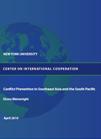 In a new report for the Centre for International Cooperation at New York University, CISS Adjunct Associate Professor Elsina Wainwright examines the conflict prevention framework in Southeast Asia and the South Pacific. The report makes key recommendations for capacity building in the region to ensure potential threats are identified and appropriately managed. In a new report for the Centre for International Cooperation at New York University, CISS Adjunct Associate Professor Elsina Wainwright examines the conflict prevention framework in Southeast Asia and the South Pacific. The report makes key recommendations for capacity building in the region to ensure potential threats are identified and appropriately managed.
|
|
The Right to Food and the National Food Security Bill (Part II)
Centre for the Study of Developing Societies (CSDS), Lokniti Newsletter May Issue, May 2010
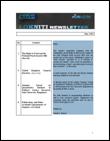 A section of the newsletter continues with the commentary on the Right to Food in the context of India’s Draft National Food Security Bill. Questions on food security, for example, ‘Security for whom?, ‘How will food security be provided i.e. what is the distribution system?’, and ‘What kind of security does it ensure?’ were addressed. A section of the newsletter continues with the commentary on the Right to Food in the context of India’s Draft National Food Security Bill. Questions on food security, for example, ‘Security for whom?, ‘How will food security be provided i.e. what is the distribution system?’, and ‘What kind of security does it ensure?’ were addressed.
|
|
China and the Global Financial Crisis: Assessing the Impacts and Policy Responses
Yan Liang, Institute of World Economic and Politics (IWEP), China & World Economy, Volume 18 Issue 3, pp 56 – 72, 18 May 2010
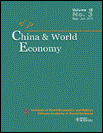 The paper explores the role of China in the creation of the current global financial crisis and the impacts of the crisis on its economy. It argues against the view that the ‘saving glut’ in China (along with other Asian emerging economies) played a significant causal role in the crisis. The global financial crisis did not engender much damage in China's financial structure, thanks to the relatively closed, bank-centred financial system. However, the impacts on the ‘real’ side of the Chinese economy were hard felt. Growth and employment have fallen, largely due to the decline in exports and foreign direct investment. Policy responses of the Chinese Government, including monetary, fiscal and social policies, have helped to stem the downfall of the economy in the immediate term, but some of the policies have not addressed the structural problems of the Chinese economy and might well aggravate such problems over time. The present paper proposes a tentative reform blueprint to rebalance the economy and to sustain long-term growth. The paper explores the role of China in the creation of the current global financial crisis and the impacts of the crisis on its economy. It argues against the view that the ‘saving glut’ in China (along with other Asian emerging economies) played a significant causal role in the crisis. The global financial crisis did not engender much damage in China's financial structure, thanks to the relatively closed, bank-centred financial system. However, the impacts on the ‘real’ side of the Chinese economy were hard felt. Growth and employment have fallen, largely due to the decline in exports and foreign direct investment. Policy responses of the Chinese Government, including monetary, fiscal and social policies, have helped to stem the downfall of the economy in the immediate term, but some of the policies have not addressed the structural problems of the Chinese economy and might well aggravate such problems over time. The present paper proposes a tentative reform blueprint to rebalance the economy and to sustain long-term growth.
|
|
Regional Environmental Performance and Its Determinants in China
Yanrui Wu, Institute of World Economic and Politics (IWEP), China & World Economy, Volume 18 Issue 3, pp 73 – 89, 18 May 2010
 A growing awareness of environmental quality has placed increased pressure on China to improve environmental protection and regulations in the country. How have the regional economies in the country performed in terms of environmental efficiency? The answer to this question is yet to be explored in the case of China. The objective of this paper is to present a quantitative analysis of environmental performance in China's regional economies and to examine the determinants of regional variation in performance. The findings are used to draw policy implications for environmental protection and are helpful in the discussion of China's future sustainable development. A growing awareness of environmental quality has placed increased pressure on China to improve environmental protection and regulations in the country. How have the regional economies in the country performed in terms of environmental efficiency? The answer to this question is yet to be explored in the case of China. The objective of this paper is to present a quantitative analysis of environmental performance in China's regional economies and to examine the determinants of regional variation in performance. The findings are used to draw policy implications for environmental protection and are helpful in the discussion of China's future sustainable development.
|
^ To the top
Commentaries
Forget Them Not: Preventing Mass Atrocities in Southeast Asia
Alistair D.B. Cook and Priyanka Bhalla, Asia Security Initiative Blog Entry, 9 June 2010
Published as
Preventing Mass Atrocities in Southeast Asia, The Jakarta Post, 15 June 2010
And
Preventing Crimes in SE Asia, The Brunei Times, 22 June 2010
Australia and Climate Change: The Changing Weather in Climate Politics
Yang Razali Kassim, RSIS Commentaries No. 81, 26 July 2010
Beyond Petroleum: Limits of Risk Management
Bill Durodié, RSIS Commentaries No. 79, 15 July 2010
Pulp Friction: Southern Development or Western Agendas?
Bill Durodié, RSIS Commentaries No. 54, 27 May 2010
Aquino’s Challenge: Energy Security in the Philippines
Kevin Punzalan, RSIS Commentaries No. 52, 24 May 2010
^ To the top |